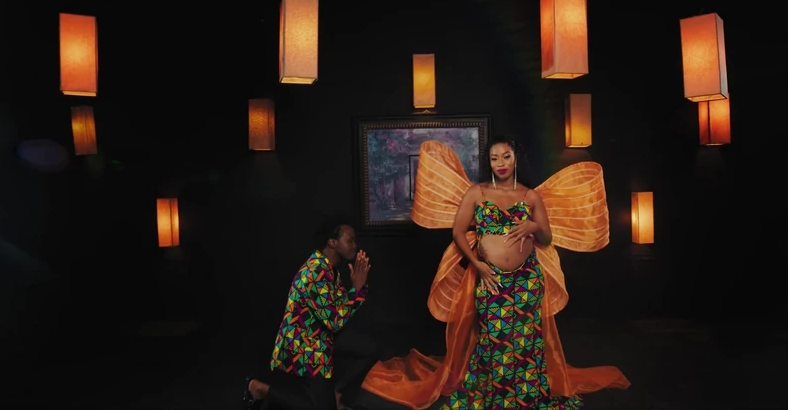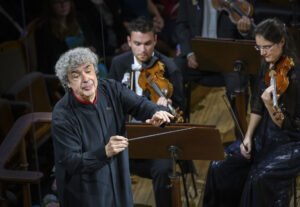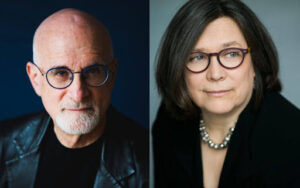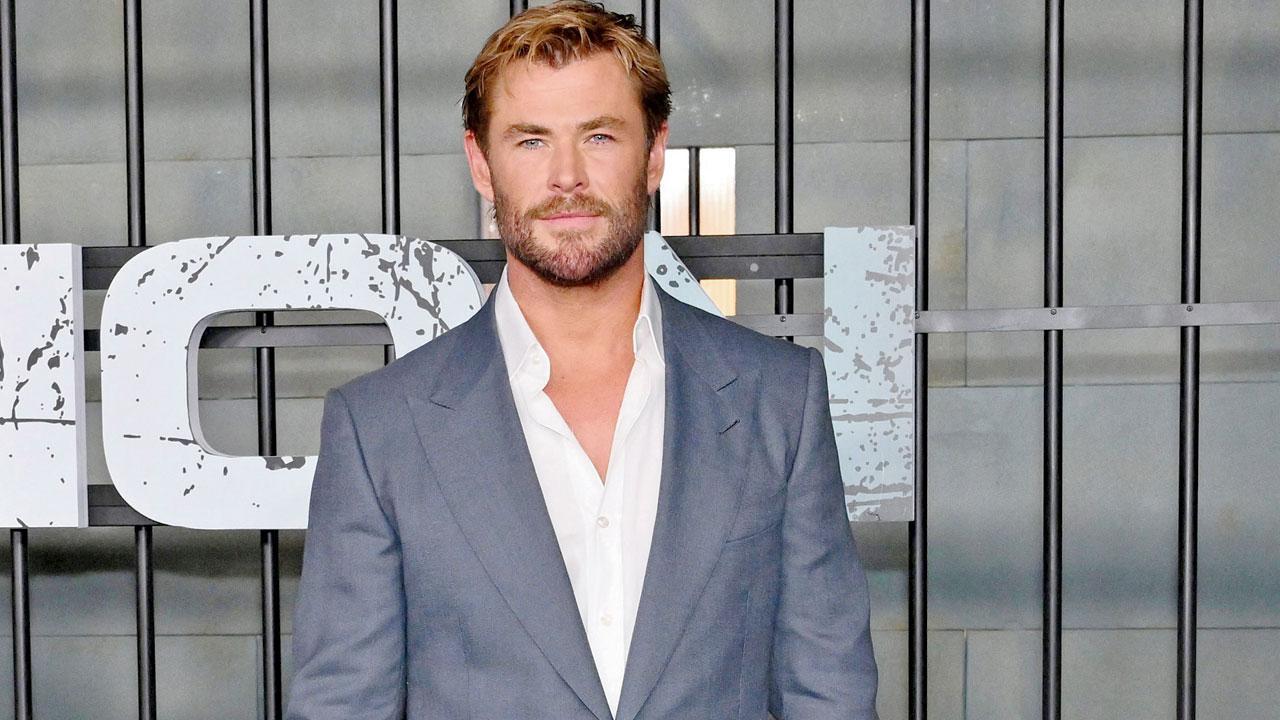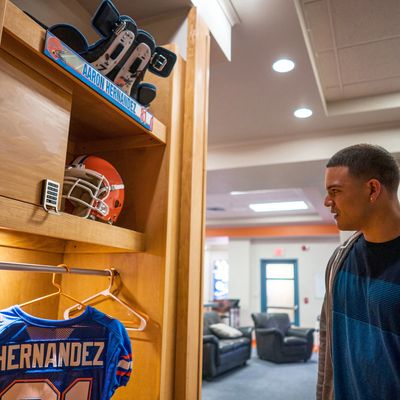
Now this is a step in the right direction. “Consequences, With Extreme Prejudice” may feature many of the same problems as the first episode, including some broad dialogue and a near-total lack of subtlety. But now that the setting has shifted from Bristol to Gainesville, American Sports Story has time to actually get into the “sports story” part.
And the phenomenon of college athletes getting away with murder (both figuratively and literally) is rife for exploration. Like the first episode, this one begins with a disorienting flash-forward, though the story catches up soon enough. Aaron wastes no time getting himself into some trouble; his wiseass attitude on the field doesn’t do him any favors when 2007 spring practice begins, especially with a coach like Urban Meyer, who expects him to know the playbook inside out.

And he still has his brother D.J. breathing down his neck, trying to convince him to transfer to UConn.
At least he makes some friends on the team, including Cam Newton and Maurkice Pouncey. But even without them, you get the sense that Aaron wouldn’t consider transferring. He’d rather push himself with the very best than settle for something less ambitious, even if a spot at UConn would mean starting every game.
The guys’ first night out turns violent quickly. At a local Gators bar, Aaron ends up punching the bartender in the face after a “misunderstanding” with the bill. It’s worth pointing out that in this telling of the incident, the bartender is gay — earlier that night, Aaron pointed him out while speculating with his teammates about who in the bar could be a “fag.
” Internalized homophobia is a consistent theme in Aaron Hernandez , and it’s clearly at play here. There’s also an element of racism, based on the bartender calling him “chico,” a line that clumsily shifts our empathy away from him right before the sucker punch. But Aaron faces minimal consequences, thanks to the assistance of the quirky Huntley Johnson (Jeffrey Nordling), the Gators’ unofficial defense attorney.
Johnson’s appearance at the crime scene is a massive relief to Aaron, who finds himself uncuffed and free to go with an assurance that nobody is pressing charges. And thus Aaron Hernandez evades consequences for the first of many times. Nordling lends an amusing oddball energy to Johnson, who warmly emphasizes his allegiance to the Gators and refers to himself as a “fan who can be of service from time to time.
” From his perspective, it’s difficult for football players not to get into trouble occasionally, considering the fame they’re thrust into on campus and nationally. The best way out is by greasing palms like Johnson does when he offers the district attorney sideline seats as a “thank you” for her leniency. “Consequences, With Extreme Prejudice” is about Aaron going off to college and learning all the wrong lessons.
In theory, Urban Meyer should be the role model who forces the 17-year-old(!) to get his head on straight in the wake of a big fuck-up like this one. Aaron does receive an inspirational coach monologue after dinner at Meyer’s house, with Meyer appealing to both his ego and the lingering influence of his dad, who would be disappointed in his actions if he could see him now. But Meyer’s story about his own tough father — a man who punished him for striking out looking during a Little League game by forcing him to walk home ten miles — only further normalizes a form of parenting that isn’t normal.
Aaron should come to understand his father as abusive, but these lessons only reaffirm his hero worship. As Aaron’s freshman year begins in the fall of 2007, the Gators’ problems with the law are only increasing. Five players have been arrested just this month, including team captain Tony Joiner, who stole a vehicle from an impound lot (and who, in real life, was sentenced to 25 years in prison for the death of his girlfriend just last year).
The booster club has plenty of reason for concern. The actual fall football season starts well, with Aaron dominating against Western Kentucky University and relishing the attention he gets as a result. But he’s still pretending to be someone he’s not, as evidenced by his discomfort having sex with a woman while his teammates sow their own wild oats only a few paces away.
Aaron can’t be bothered with campus groupies; he’d prefer to discreetly connect with men in online chat rooms. When he meets up with one of them in the final scene, though, his newfound fame and resulting paranoia come to rear their heads. Worried someone saw him, he ditches the planned hookup and heads home.
It’s hard to know for sure how to label the real-life Aaron Hernandez’s sexuality, though stories from friends (like the real Dennis SanSoucie) indicate he was almost certainly attracted to men. But this series is so far leaning pretty hard into the queerness angle, with the writing and acting depicting the man as unambiguously gay and isolated due to his almost entire lack of interest in women. (Even while sharing a tender moment with Shayanna at the dance in episode one, he couldn’t help letting his gaze wander to Dennis.
) That’s sure to be a controversial choice for some viewers, especially for the potential implications of Hernandez’s crimes. It’s still early on, but I’m already a bit skeptical of the framing; most of this has at least some basis in reality, with countless stories and interactions borrowed from the Gladiator podcast, but the editing and the writing risk drawing too clear of a line from queerness to toxic masculinity and, well, murderousness. The show actually has a lot easier time holding my attention when it comes to the nitty-gritty of college sports: the pain mixed with the glory of getting more time on the field after a friend and teammate gets injured, for example.
Aaron’s second run-in with the law (and second time taking advantage of the program’s protection) happens after a two-loss streak five games into the season, during a fateful visit from his older friends Carlos Ortiz and Bo. Broadly speaking, Aaron Hernandez has done a decent job resisting the temptation to draw a strong distinction between Aaron’s teammates and some of his tougher gang-affiliated hometown buddies (Bo and Ortiz, who were locked up together). Maybe the players and coach would encourage that distinction, but we see in this episode that Aaron was far from the only player who broke the law and benefited from Johnson’s bribes.
Cam Newton certainly never did anything like approaching a car outside a nightclub and shooting two passengers, but the system that protects him from a minor infraction like stealing a laptop is the same system that protects Aaron from much worse crimes. We don’t see the shooting go down, maybe because so many of the real details are still unclear. But it sure seems like Ortiz’s immediate antagonism at the bar starts the brawl that leads to the shooting, possibly an act of revenge after the theft of a Pouncey twin’s chain.
When we see Aaron next, he’s being questioned by the police, returning to the opening scene. Something’s gotta give; the arrests are continuing to pile up, with UF president Bernie Machen name-checking Aaron and Cam along with Jamar Hornsby, Jermaine Cunningham, and someone I assume to be Jacques Rickerson (though it sounds like he says “Richardson”?). Meyer, who has a panic attack whenever he thinks too hard about the risks of leaving the problem unaddressed, needs to make an example of someone — toss out one bad apple to convince everyone the rest are still good.
Who would make the best scapegoat? It sure isn’t the promising new star tight end. The scapegoating of Cam Newton works pretty well narratively, even if it didn’t all go down exactly like that in reality . There’s an element of dark humor in Meyer’s sit-down with Aaron, during which he insists that Aaron “understand there are consequences for [his] actions,” only to slap him with a mild suspension many months away.
When Aaron steps outside, once again a free man, he earns a chorus of cheers. Lesson learned? • Director Carl Franklin shoots the actual football scenes pretty viscerally, giving them a grainy and stylized look. Maybe the high contrast and sharp edges are meant to bring to mind televised games.
I don’t dislike it, but I also wouldn’t have minded a more natural vibe. • I’m not an expert, but as far as I can tell, much of the chronology is fudged here. In real life, Cornelius Ingram doesn’t hurt his knee until fall practice of the 2008 season, leading Hernandez to step in.
Cam Newton’s arrest also didn’t happen until November 2008, though he did indeed steal a laptop and “ toss the computer out his dorm window in a humorously ill-advised attempt to hide it from the cops.” And while Aaron did sit out the Hawaii game at the start of the 2008 season, it was for a failed drug test. By submitting your email, you agree to our Terms and Privacy Notice and to receive email correspondence from us.
.


